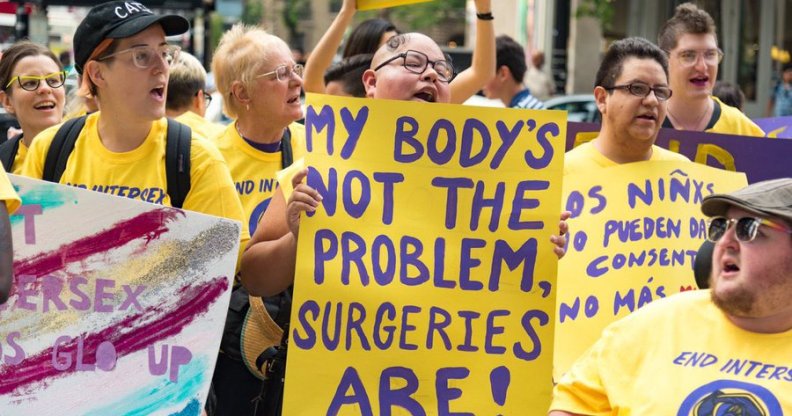This trans intersex person explains why they didn’t need surgery to be ‘fixed’

Intersex Justice activists protest non-consensual surgeries on intersex people. (Twitter/ IntersexJustice)
A trans intersex person has explained, in a moving opinion piece for Intersex Awareness Day (October 26), why they didn’t need surgery to be “fixed”.
There are many different ways that a person can identify as intersex, which is an umbrella term encompassing those who are born with sex characteristics outside of the binary “female” and “male” definitions.
Maddie Rose, who uses they/them pronouns, wrote about their experience growing up with Mayer-Rokitansky-Küster-Hauser syndrome (MRKH) for Teen Vogue.
People with MRKH are born with XX chromosomes but the genetic condition usually causes the vagina and uterus to be underdeveloped or absent.
One of the goals Intersex Awareness Day is to end “corrective” surgeries on the genitals of intersex children and babies. These surgeries are often medically unnecessary and can cause long-lasting harm.
Maddie Rose underwent surgery when they were older and able to consent, but wrote: “It’s not enough to be told a surgery isn’t medically necessary if the implication is that it’s socially, sexually, and biologically important to be ‘fixed.'”
They had surgery at the age of 17 to create a vagina, and wrote: “I was confidently told I wouldn’t be able to have sex — at least not until I fixed the ‘problem’ through vaginal dilation or surgery.”
But, they said, the idea that they would not be able have sex was based on the assumptions that they were “definitely a girl” and that sex was “when the penis goes inside the vagina”.
Although at the time being told that they could not have sex was “devastating”, they said they now realise: “Saying that only penetrative sex is ‘real’ sex ignores the alternative kinds of sex people have been having for forever.
“Gay people, people with conditions like erectile dysfunction or vaginismus, and probably whoever first invented the vibrator all frequently skip penetration.”
They added: “I felt backed into a corner by homophobia, misogyny, and transphobia.
“If I’d known at the time that both sex and bodies can look like so many varied, wonderful things, would I have still made the decision I did?”
Looking back almost a decade later, they said: “What I don’t remember is, at any point prior to the surgery, being told I didn’t really need it.”
Going forward, Maddie Rose said that in the medical community as well as in society generally, we need to have “conversations about sex in all its various forms, and the knowledge that genitals don’t equate to maleness or femaleness…
“Intersex people require freedom from the social demands of what sex, bodies and gender should look like, so that our bodies can be sculpted by us and us alone.”
Since it was first observed in 2004, Intersex Awareness Day has served to shine a light on the human rights issues faced by intersex people with the goal of ending “shame, secrecy and unwanted genital surgeries on intersex children.”
Intersex Americans could account for up to 5.5 million, or 1.7 percent, of America’s population. To put it into context, experts say that intersex people are about as common as those with red hair.

